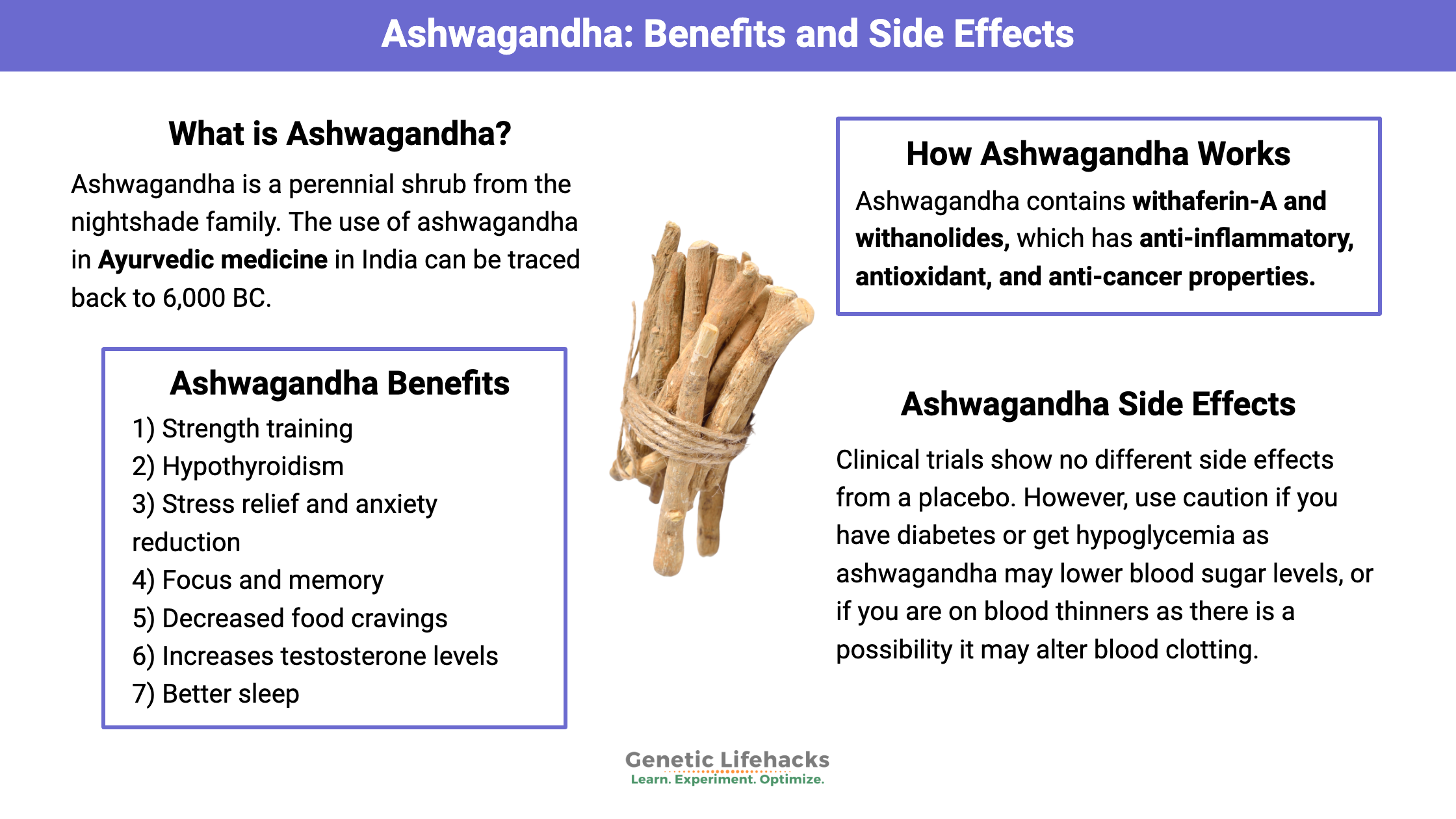Ashwagandha is one of those supplements that I’ve always viewed with a bit of skepticism. Reading claims such as “it’s a calming adaptogen” or that ashwagandha “nourishes the adrenals” made me instinctively distrust the purported benefits.
When you get past the meaningless buzzwords, the clinical trial data from randomized placebo-controlled trials clearly show significant and specific benefits of supplemental ashwagandha. This article digs into some of the high-quality research studies on ashwagandha, creating a picture of a long-used natural supplement with positive effects.
What is ashwagandha powder?
Ashwagandha (Latin name Withania somnifera) is a perennial shrub from the nightshade family. The dried root of the plant has been used traditionally in Ayurvedic medicine.
The use of ashwagandha in Ayurvedic medicine in India can be traced back to 6,000 BC. The root of the plant is dried and ground before use.
Historically, ashwagandha was used as a tonic in children who weren’t thriving or in the elderly who were becoming frail. Additionally, it was used in traditional Indian medicine for insomnia, stress, anxiety, and inflammation.[ref]
8 Research-backed benefits of ashwagandha:
The clinical trials and research on ashwagandha are extensive, with results ranging from neurological impacts to hormone modulation to improving mood disorders.
Let’s take a look at the placebo-controlled clinical trials…
1) Strength training improvements from ashwagandha:
A clinical trial using 500 mg/day of ashwagandha (Sensoril®) showed increased gains in strength training after 12 weeks compared to a placebo group.
The study participants were men in their 20s who were ‘recreationally active’. One of the measured results was that the ashwagandha group had average gains of 19 kg in squats compared to only 10 kg gains in the placebo group.[ref]
2) Subclinical hypothyroidism:
A randomized double-blind placebo-controlled trial in adults with hypothyroidism found that ashwagandha reduced serum TSH levels. The trial used 600 mg twice daily of ashwagandha root extract. The results: “Ashwagandha treatment effectively normalized the serum thyroid indices during the 8-week treatment period in a significant manner”.[ref]
3) Ashwagandha for stress relief and anxiety reduction:
A 60-day, randomized, double-blind, placebo-controlled study in adults found that 240 mg of ashwagandha extract (Shoden brand) twice daily decreased anxiety scores.[ref]
A clinical trial for generalized anxiety disorder found that 1g/day of ashwagandha extract worked better than a placebo for decreasing anxiety scores.[ref]
Another clinical trial using 300 mg ashwagandha extract twice daily showed that it decreased anxiety… but it didn’t work as well as psychotherapy.[ref] So while ashwagandha may work, you may want to seek out traditional options for anxiety management as well.
In addition to reducing stress assessment scores, ashwagandha also decreases cortisol levels substantially. The clinical trial involved 300mg of high-concentration ashwagandha extract for 60 days. Serum cortisol levels decreased by over 20%.[ref]
4) Improved cognitive function: focus and memory
An 8-week-long clinical trial of 300 mg twice daily ashwagandha root extract shows increases in immediate and general memory test scores. The trial focused on people with mild cognitive impairment (early dementia).[ref]
5) Decreased food cravings in stressed-out people:
Twice daily 300 mg ashwagandha for eight weeks improved both stress eating and food cravings. What didn’t significantly change was weight…The participants lost about 5 lbs on average, but this wasn’t statistically significant compared to the placebo group.[ref]
6) Ashwagandha increases testosterone levels in overweight, middle-aged men:
An 8-week trial of ashwagandha extract (Shoden beads) increased testosterone by about 15% and DHEA-S by 18% in overweight men.[ref]
7) Sleeping better with ashwagandha:
A clinical trial found improvement in sleep quality in the participants taking ashwagandha. Sleep was markedly improved in people with insomnia compared to normal, healthy sleepers. The trial used twice-daily doses of KSM-66, a specific formulation of ashwagandha.[ref]
In another clinical trial (300 mg/ twice daily), ashwagandha helped people fall asleep faster and have better sleep efficiency.[ref]
8) Improved sexual function for women:
A randomized-placebo-controlled clinical trial using 300 mg/twice-daily ashwagandha root extract found that it improved sexual function in adult women (ages 21-50).[ref]
How does Ashwagandha work?
The biologically active constituents of ashwagandha include withaferin-A and withanolides.[ref][ref]
Withaferin-A has anti-inflammatory, antioxidant, and anti-cancer properties. It increases the body’s natural antioxidant enzymes including SOD, GSTs, and Nrf2. As an anti-inflammatory, it inhibits IL-6, IL-1B, COX-2, iNOS, and NF-kB. The anti-cancer properties include preventing proliferation as well as blood vessel growth in tumors.[ref]
Withaferin-A decreases the inflammatory COX-2 and PGE2 response when challenged by bacterial infection.[ref]
Timing of ashwagandha dosage:
Many natural supplements can change the circadian rhythm or can be more effective at different times of the day. This is true for ashwagandha also.
Animal studies show that ashwagandha can restore the daily rhythm of Nrf2 and SIRT1. The circadian rhythm of these important pathways is often altered or abolished in aging.[ref]
Most human clinical trials use a divided dose of ashwagandha, with 300 mg in the morning and 300 mg at night. Even the placebo-controlled trials on sleep used twice-daily doses.[ref]
Safety and potential side effects of ashwagandha:
Talk with your doctor, especially if you are on medications, before taking ashwagandha.
Ashwagandha has been used for thousands of years as a traditional herbal medicine. In clinical trials, the side effects do not differ from placebo. Most of the clinical trials (listed above) are using ashwagandha root extract in doses of 300 mg to 1200 mg per day.[ref][ref]
Research studies using ashwagandha (both animal and human) show no real toxicity issues.[ref][ref]
Keep in mind that Ashwagandha may lower blood sugar levels, so if you have diabetes or get hypoglycemia, talk with your doctor about this (and all) supplement.[ref]
For people with hyperthyroidism, be aware that ashwagandha may slightly increase thyroid function.[ref]
If you are on blood thinners, there is a possibility that ashwagandha will slightly decrease clotting. Again, talk with your doctor.[ref]

